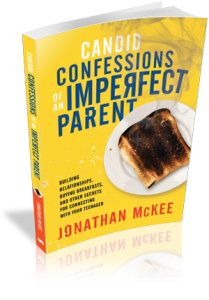 “My kids need guidelines! What rules should I impose?”
“My kids need guidelines! What rules should I impose?”
Not so fast. What good are guardrails if we don’t even know where the road is going?
Yesterday I proposed that guardrails are only part of any road taken, and the biggest question to consider is… where is this road going? Once parents provide a Biblical foundation for their values, then the guardrails can flow from this truth.
So I guess the process looks like this:
- Embark on the road of Biblical truth (I talked about this in yesterday’s post).
- Plot your trip, knowing where you’ll be, by when (we’ll talk about that in today’s post).
- And finally… set guardrails that keep you from veering off course (my next post, now posted).
So let’s talk about “plotting our trip,” to continue using the road analogy. In other words, where do we want our kids to be, and by when?
No rules by 17½
My goal is that my daughters won’t have any rules by age 17½.
Some parents think I’m nuts. But consider my reasoning.
- If I did my job right, my 17½-year-old will need very little guidance at this point anyway.
- They’re free to do what they want at 18 anyway, so I might as well let em’ have a trial run while I’m still there to pick em’ up when they fall.
Parents need to look at the big picture and “plot their trip.” I don’t think many people would argue that toddlers need a lot of guidance. If we’re playing with our two-year-old son on the front lawn and he starts heading toward the busy street, not many parents would just let him run off, with a, “Let him learn the hard way!” Parents understand toddlers need lots of guardrails!
On the opposite extreme, when our kids get to age 18, they can pack their bags, move out, join the army and tell us where we can shove it (hopefully the situation won’t be that dire). At this point we can’t impose any guardrails. They are on their own. Hopefully, by then we will have already prepared them for making decisions in the real world.
Are all 18-year-olds ready to make decisions on their own? Sadly, no. But the reality is, when they are 18, they can legally move out, get their own place, and begin making all their own choices. So I guess the big question is, how do I “plot the trip” and slowly prepare them for real world decision making by the time they are age 18?
My goal is to get them there by 17½ so they can begin experiencing this freedom while still under my shadow.
Some parents obviously don’t have their eyes on the calendar. They don’t realize that the date is rapidly approaching when their kid will be free from the prison-camp they were raised in. The overprotective parent enforces so many rules and regulations, the teenager never learns to make decisions on their own. Every decision was already made for them. They were just handed a list of rules:
LEGALISTIC RULES
Lady Gaga– no, she’s the devil
R-rated movies– no way
Amy Grant- nope, adulteress
…and the list goes on
How is this going to teach our kids discernment?
On the complete opposite end of the spectrum, we have the overly-permissive parent. This parent really doesn’t want to be overprotective, so they just let their kids do anything they want. They figure, “They gotta learn sometime!” So their 8-year-old girl has every song she wants on her iPod, their 12-year-old boy has a TV in his bedroom with a Showtime subscription, and their 15-year-old girl has her boyfriend over to spend the night several nights a week.
I think most parents would agree that neither extreme is good.
So how do we set guidelines?
A Segue
I think the needed balance is a segue—a gradual decrease—from heavy guidance to very little guidance. This is basically the concept of incremental independence. When my daughter was 5, I didn’t give her the keys to the car. When my son was 16, I didn’t let him go on a road trip with his girlfriend for the weekend, even if he “promised to be good.”
As parents, we’re used to providing age-appropriate discipline and guidelines:
- Toddlers need playpens and cabinet locks so they don’t hurt themselves.
- Kindergarteners need discipline when they don’t share their toys.
- 5th graders might need to have their video games taken away for a week when they hit their sister.
- 13-year-olds might need to look up the lyrics of a song and discuss it with their parents before downloading it, because the words do affect them.
- 16-year-olds need to turn their iPhones off at night so they aren’t texting into the midnight hours.
As I mentioned yesterday, these guardrails should all help our kids stay on course and begin to teach them good decision-making.
- They don’t know that a good night’s sleep actually helps them; subsequently, we impose a bedtime so they can get the needed 9+ hours of sleep. By age 16 or 17, they might begin see the value in a good night’s sleep.
- They don’t realize that texting while driving is dangerous, so we tell them, if they ever text while driving, they lose both a car and a phone! If they ever see the real world consequences of someone texting and driving—a ticket, an accident, injury or death—then they begin to see and experience the logic behind this guardrail.
- They don’t recognize all the subtle lies of the media, so they have to watch certain TV shows with parents first, discussing the content and seeing if it’s appropriate. Parents don’t just label shows “good” or “bad,” but teach them to think Biblically about their entertainment choices.
As our kids get older, we will incrementally be able to trust them with more and more decision-making. When my daughter was 13, we looked at all music lyrics together and talked about them before she could download them. When she was 15, I wouldn’t check the lyrics, I just asked her, “Did you Google the lyrics?” She would tell me she had, and we’d talk for a few minutes about the song (it helps that I’m researching this stuff for my job, so I can tell that she wasn’t just making stuff up). By 16, I gave her permission to download without asking, but then we’d discuss it. (It helps that we “homeshare” with the same iTunes account. So anything she downloads, I get.)
In short, as my kids grew older, I expanded their freedom. I did this recently with my 17-year-old (she’s nearing 17½), talking with her about why she wanted to go to the homecoming dance, and eventually letting her make the choice. I think she chose wisely.
This segue from high guidance to low guidance is filled with opportunities for conversations. The more conversations, the better. Watch TV together and talk about it. Download music together and discuss it. Have weekly breakfasts or coffee together and talk about real life.
Then… when your kid turns 17½ let them free to make their own decisions… 6 months early! Think about it:
- This is only 6-months before they can do it anyway.
- This way, if they fail, they do it in the safety of your shadow, and you are there to pick them up.
Does this mean I’m going to let me daughter have a boyfriend over to spend the night? Nope. I still have rules of the house (and luckily she wouldn’t do that anyway). Just like my 19-year-old son who’s living at home this year while attending college—he can do whatever he wants, but while choosing to live at home, he has certain guidelines like telling us when he’ll be home. We’ve also given him incentives, like if he gets a 3.5 GPA, we pay for his gas.
My daughter Alyssa will have this kind of freedom in a few months when she’s 17½. At that point, she finally gets to download what she wants (but we’ll still have conversations about music), she finally gets to watch whatever she wants (and she probably won’t watch much different), she finally gets to stay up as late as she wants (she’s usually tired and goes to bed early right now)… but she is the one making the decisions.
Are you getting your teenager ready for that day?
In my next post I talk about what guardrails I’ve actually set to help my kids prevent veering off course.
IF YOU LIKE THIS ARTICLE,
YOU’LL LOVE HIS PARENTING BOOK,
Candid Confessions of an Imperfect Parent
AND YOU’LL LOVE THESE OTHER ARTICLES FROM JONATHAN:
Deciding if Hunger Games is Appropriate
Posted in Parenting | | Leave A Comment



 Follow
Follow
Brother Jonathan, once again a great article and great approach to bringing kids up in this world. And once again, thanks for all the awesome resources you provide for us! And as always, your wit cracks me up.
Fantastic article Jonathan. With a soon-to-be 15 year old, and having a lot of these discussions, it is especially helpful. Thanks!
Awesome post! I have 8 month old twins
and to think I can impose regulations and rules
when they are at an age of reason is futile.
You bring to light the importance of getting
our kids to think independently. Personally,
I believe adults have a hard time with this concept.
Thanks!
What is your opinion of having teens do chores around the house? I’m 17, have my chores around the house and do them. My problem with my mom is that she nags me to do them constantly. What do you think about this source of conflict in our house?
I think chores are a great way to teach young people responsibility. Nagging isn’t a good way to communicate… instead, mom should sit down and outline expectations and clear consequences of what will happen if those expectations aren’t met. So you, a kid, need to ask yourself… do you want the nagging to continue, or a mom who actually follows through with consequences? 🙂
Thanks Jonathon! I will be looking at this situation….. I really love your blogs, thanks for the advice!
My brother suggested I might like this blog. He was entirely right.
This post actually made my day. You can not imagine simply how much time I had spent for this information! Thanks!